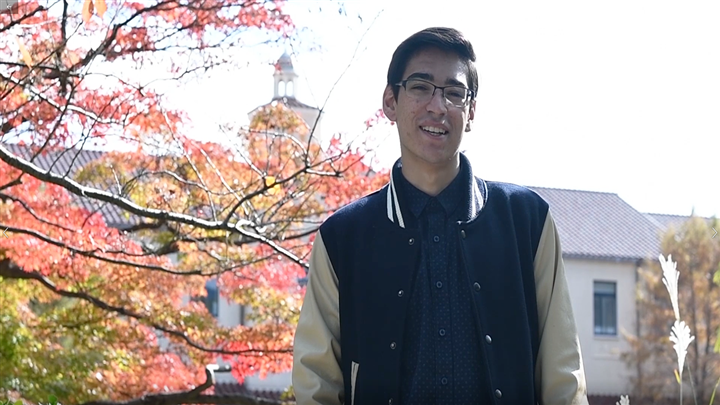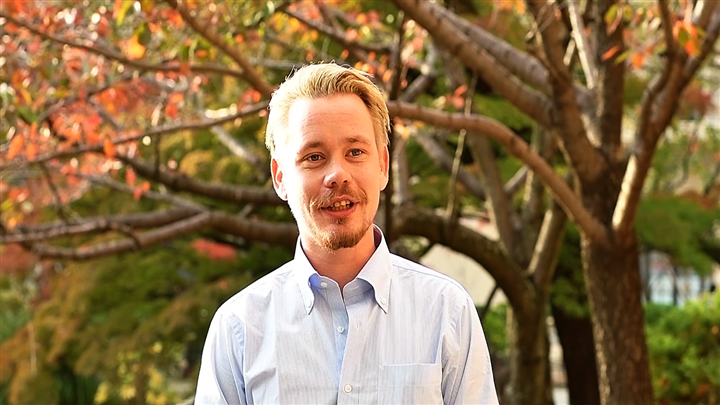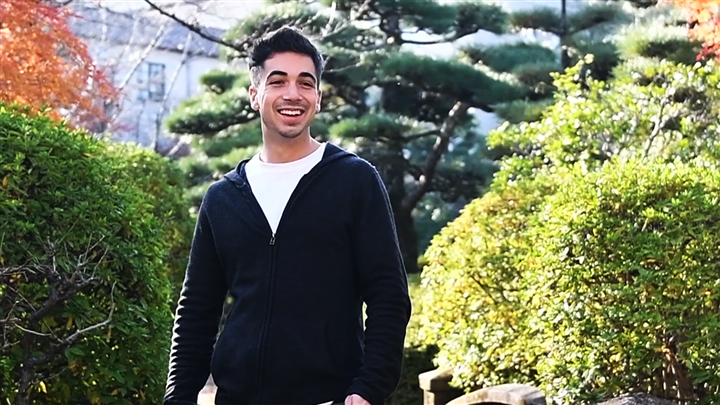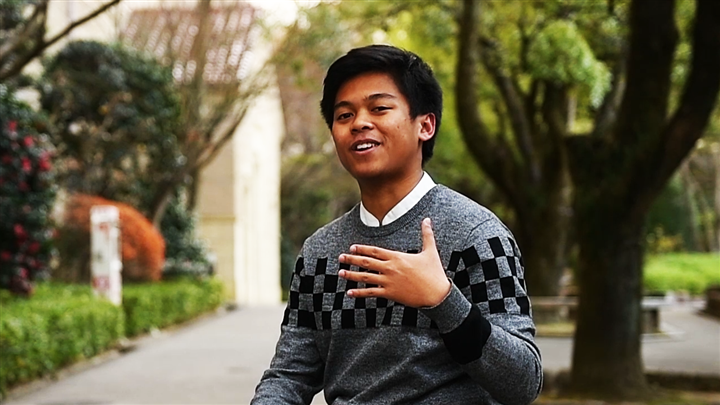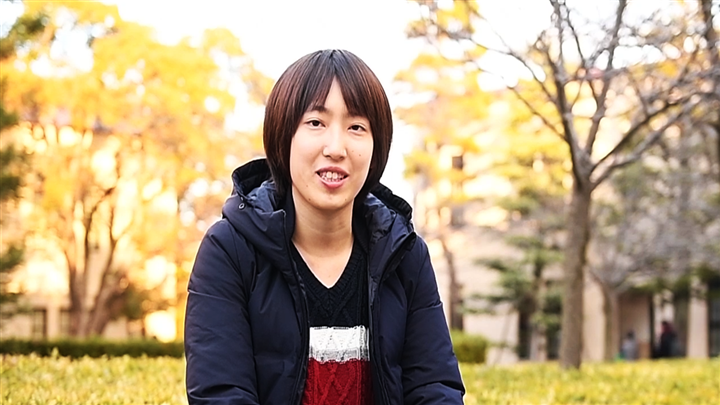- TOP
- Campus Life
- Studentsʼ Voices Top Page
- International Activities
- Jorge Eduardo Nieto, University of Nebraska at Omaha

Students' Voices
Jorge Eduardo Nieto, University of Nebraska at Omaha(Colombia)
2019.11.27
Public Relations Office
Choosing KGU
What made you decide to study at KGU?
My friend said he had a couple of friends who went to UNO who had gone here, so I decided to apply with him. Turns out he couldn’t come, so I came by myself, and that was it.
How much Japanese did you have before you came?
About two years ago I started studying Japanese, but I didn’t continue studying so when I came back, I didn’t remember a thing (laughs).
Are you staying with a host family or in the dorms?
I’m staying in the dorms. I’m in Takarazuka Residence 2.
How have you found it?
I absolutely love it. We have our own private bathroom and room, so I found that amazing. It’s extremely comfortable, you know, you got your own privacy and our manager is always helping us with things.

On KGU Student Life
Can you walk me through your average class day?
I’m in the Japanese Language Track program in Level Pre-1, so I have Japanese class every day. I tend to go to the Global Lounge to have lunch or eat something during chapel hour or lunch break, I have as many classes as I have on that day, and I leave.
How are the Pre-1 Classes?
I love them. We have three teachers, and I find they’re very helpful. There were all these structures and words in my head that I knew I learned at one point, but couldn’t remember them. There are only three of us in the class, so I like that they pay attention to each person’s strengths and weaknesses, and they have this ability to just focus on what each person needs.
Other than the language classes, have there been any other courses that have been really interesting?
I’m taking both Japanese Psychology and also Ethics, because that’s an interest of mine. Those classes are by far the most interesting. I find it amazing because we take the mindsets of each of our different nationalities and compare them to Japan, so we do get to learn about the sense of morality that exists here, which is something I wanted to learn about in particular before I came. The Japanese Psychology class gives a lot of insight on why things are the way they are in Japan, how it differs from other countries and what these differences mean for people. I guess you always hear how Japan is distinct from other countries, right, but this brings it to more of a personal level.
Are there any particular spots on campus where you spend a lot of time?
I spend a lot of time in the Global Lounge, but I also spend a lot of time in the Japanese garden. I go as often as I can. When the sakura were blooming, that was by far the best spot on campus, and not too many people were there, so I enjoyed it a few times by myself and it was amazing. The Central Lawn is really nice, and the weather’s nice these days. I usually bounce between those three places.
How do your classes here at KGU differ from your classes back home?
Our priorities are mostly the same, but Americans seem to be more outgoing and feel like being the center of attention, so there’s a lot more discussion and people going back and forth in classes in the States. Also, at my home university, the dress code is very relaxed, you know, you see people in pajamas… here, there’s more of a distinction, I think people feel more respect for the class. I guess people skip less class here (laughs).
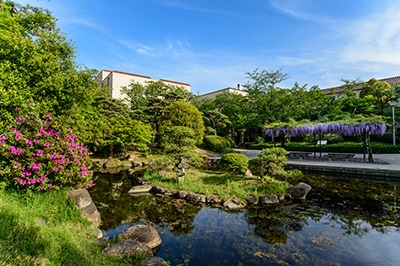
The Japanese garden at KGU
Future Aspirations and Advice for Prospective Students
From the perspective of someone who’s done their exchange program at KGU, what would you say to a student who was thinking about coming here?
Even at my home university in the States, I always felt like an international student, so to me, going abroad was not a big deal, but my friend who was going to come with me did a lot of thinking about it, he didn’t know what it would be like to live in a different place. But I would tell people “Just do it.” Decide where you want to go and do whatever you need to do to get there. Once you’re here, make sure that you take classes that are part of your interests, but also take stuff that’s outside of your comfort zone, especially language class electives, because those will help you in your daily life with basic phrases and other things.
Also, know how to balance your school life and other activities. We’re not on vacation - we’re studying towards our degrees back home. However, you’re going to be very far from home and you’re definitely going to have many experiences that you’ll remember. Keeping in mind that you have to do well in class, be outside as much as you can and travel as much as you can. Talk to as many people as you can. I tend to be very reserved in the States, I don’t really go out too much, but here I find myself somewhere different every day, because whenever someone asks me to do something I say “Sure, let’s do it.” I’m trying to live as much as I can here. There are so many things we don’t have at home, like festivals and food.
A lot of people come here from the States and they have problems with things being different. I understand how that’s a challenge, but I think that’s the reason why you decide to study abroad, to learn how things are done somewhere else. People can push through it and feel at home wherever they are.
How will you take what you’ve learned here and apply it to your continuing education?
What I learned here was mostly language-related. The main thing I would like to be able to do is speak better Japanese, because I definitely want to come back at some point. As an International Studies major, the experiences I’ve had with people from many different countries, those are a big thing for me. I like putting myself in an environment that I don’t know as well. I had an interest in Japan before and I had somewhat accurate expectations for what it was going to be like, but it’s very different to have expectations about Japan and to actually live in Japan. I had a problem with having to be quieter – Colombia is a really loud country and America is too. We play our music loudly and we talk loudly on the phone all the time. Here that’s really frowned upon, so I had to look at myself and make those changes.
What I took from the exchange program is the knowledge that you view everything through glasses that have a picture of your culture on them. When you deal with people from other cultures, which I expect to be doing quite a lot of in the future, you have to do your best to remove those glasses, make them comfortable, and come to a balance between your cultures.
Last question: What’s your favorite Japanese word or phrase?
I don’t know about a favorite, though I can tell you one phrase I’ve used most days I’ve been here – “nama biiru onegaishimasu” (a draft beer, please). (laughs) I feel like Japanese has so many amazing phrases, so it’s not my favorite, but it’s definitely a very useful one.

